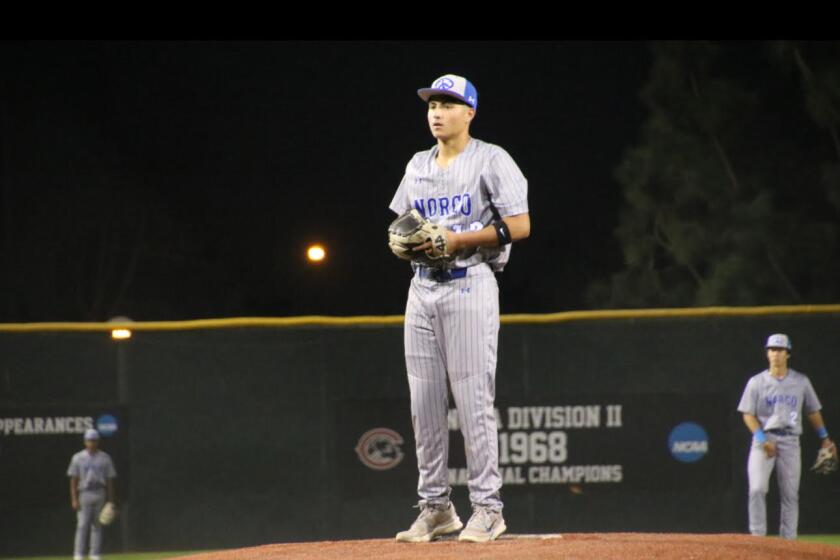Umpires’ Arbitration in Doubt
- Share via
With the resignations of 22 major league umpires having become effective Thursday, their union faced the possibility that one failed labor strategy could lead to another.
In exchange for management agreeing to keep the 22 on salary through the final month of the season and submit the dispute to arbitration, the union agreed to withdraw a federal lawsuit and its allegation to the National Labor Relations Board of unfair labor practice by management.
The hope of the 22 umpires for reinstatement in 2000 now rests with the ability of the union to convince an arbitrator that the umpires were actually fired and that the resignations were only a negotiating ploy that baseball did not have a right to accept. However, the risk for the union--aside from the opinion of most labor experts that the umpires have little hope--is that the process will not even get to a final judgment.
Although the collective bargaining agreement between the union and baseball calls for arbitration in the event of disputes, baseball lawyers will argue that the arbitrator does not have jurisdiction in this case because, as one said Thursday, “resignations are outside the scope of the bargaining agreement.”
Union officials did not return calls, but the baseball lawyer said that even if the arbitrator decides he has jurisdiction and agrees with the union contention that the 22 umpires were fired, “the bargaining agreement leaves those decisions up to the league presidents, with no appeal.”
Although it may be several weeks before a hearing date is set, the Philadelphia branch of the American Arbitration Assn. did provide each side Thursday with a list of 15 arbitrators from which they will attempt to agree on one.
According to sources, union lawyers negotiating with their management counterparts on Tuesday and Wednesday in Philadelphia had given Commissioner Bud Selig the opportunity to employ the 22 umpires at his discretion--often or not at all--over the remainder of the season but he rejected that proposal.
Selig refused comment Thursday, but a baseball official labeled the proposal “nothing more than a dishonest charade” by union counsel Richie Phillips.
It is expected that those umpires opposing Phillips’ leadership will soon try to force a vote on his status or to petition the NLRB to form a new union. The success of either of those endeavors may hinge on whether the 22 ousted umpires, while still being paid and supporters of Phillips, retain voting rights--a decision that may also rest with the NLRB.
American League umpire Joe Brinkman, among the leaders of the group that opposes Phillips, said Thursday that if Phillips remains in charge he expects management to lock out the umpires starting Jan. 1, as was done when the last bargaining agreement expired in 1995 (the current agreement expires Dec. 31), “and we would probably not be allowed back until mid-season.” If Phillips is replaced, Brinkman said, there is a strong likelihood that “we can avoid” that scenario.
Around the Majors
Hall of Famer Willie Stargell, 58, said Thursday he hopes to be released from a three-week hospital stay by Monday but declined to comment specifically about his health problems. Stargell, the Pittsburgh Pirates’ career leader in home runs and RBIs, has been hospitalized in Pittsburgh since early August, undergoing blood tests and kidney dialysis, according to several Pirate sources. . . . New York Met shortstop Rey Ordonez needed six stitches over his left eye after a fight with teammate Luis Lopez early Thursday on the team bus. Ordonez is ay.
The Associated Press contributed to this story.
More to Read
Go beyond the scoreboard
Get the latest on L.A.'s teams in the daily Sports Report newsletter.
You may occasionally receive promotional content from the Los Angeles Times.










